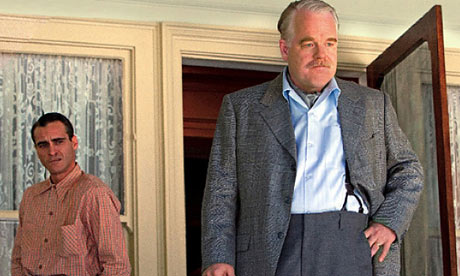The Master (4 1/2 out of 5 Stars)
Directed and Written by Paul Thomas Anderson (There Will Be Blood, Magnolia, Boogie Nights)
Starring: Joaquin Phoenix, Phillip Seymour Hoffman, and Amy Adams


I may have found a new spiritual film God in Paul Thomas Anderson. All jokes aside, the concepts of self-worth and faith are at the center of The Master. This film will get a lot of attention because of the comparisons to Scientology, and its found L. Ron Hubbard, and there are numerous similarities. This film is more than just a comparison to the modern day cult with followers like Tom Cruise, and Kirstie Alley. This film is about the journey of a lost soul and his master.
The film centers on the tragic and disturbed Freddie Quell (Joaquin Phoenix), a navy vet from World War II who is looking to find his own place in society. Quell attempts to find solace in making his "hooch," with numerous jobs, and in the hope that "his girl" will wait for him. As Freddie stumbles onto this boat party one night he finds himself getting lost in the world Lancaster Dodd (Phillip Seymour Hoffman) the master of the group called the Cause. Dodd and his wife Peggy (Amy Adams) travel around with their family to the homes of their followers helping folks find the connection to things like the cure or Lukemia through the science of exploring their past lives.
Sounds like a cult right? There are numerous connections between the progression of Scientology by Hubbard, especially the way his work was an outgrowth a book he wrote Dianetics: The Modern Science of Mental Health. Yet there is something brilliant about the way Anderson constructs this film to not be a bio-pic of Hubbard, or an expose on this real life cult. Although some of the practices are apparently similar. Anderson uses his incredible screenplay and direction to make this a film about so much more.
One of the brilliant aspects of this film is the way Anderson focuses on Phoenix's Quell and the disillusionment he faces in a post World War II society. Most people always painted the 50s as this golden era of family values, the husbands/men came home from the war they got their plot of land in Levitttown, settled with their "girl" and led a happy life. Anderson uses the concept of this lost soul and the newly developed "religion" which takes advantage of those people had no place when they came back from the War. The one flaw is that film has a bit of a slow start, and while it does not take off right away, the film sets an intense pace once the three leads take the stage.
Anderson and his casting team created one hell of a trio. Phoenix who plays this shell of a disturbed man makes you lose yourself in his character; he is effortless, which is almost frightening. Freddie is someone who has always been repelled from the establishment yet he joined the Navy; he has gone from place to place, and abandoned all institutions, but he is drawn into the world of the Cause, but as Lancaster and Peggy both question, is this man beyond help. Phoenix needs no help, he all but disappears within this role, and gives one of the best performances of his career; he is a true chameleon.
I could go on and one about the performances in this film, namely because they add such great depth to the script. While Phoenix disappears, Hoffman as usual is another frighteningly believe able actor. Is Dodd a villain, no because Hoffman never takes him to that place. Even as Lancaster Dodd steals from his members of the Cause, goes to jail, you still believe in almost as though you are a member of the cult. This proves just how talented Hoffman's acting skills are, and if there were a ever a year where there could be a tie in the Best Actor race at the Oscars I would it to be for these two men.
The ambition of the performances from these two men, and the supporting work of Amy Adams proves to be on of the films strongest aspects, but the film is also a technical marvel. Anderson shot this film with the larger 70 mm technique, and hats off to the beautiful cinematography done by Mihai Malaimari Jr. The visuals of the camera are so gorgeous you can find yourself getting lost in the visual imagery. The visual marvel combined with outstanding score from Johnny Greenwood makes this film one of the best films of the year.
I was hypnotized by this film as though I was sitting on the couch hoping Lancaster Dodd would help me connect my past lives in order to make sense of it all. Paul Thomas Anderson has created a film that explores the concept of of religion/spirituality/faith/cults without being heavy handed; he never shoves his message on the audiences, and in a post Summer haze it's nice to go to the movies and be shown a film that does not intend to brain wash me, or did it?
No comments:
Post a Comment